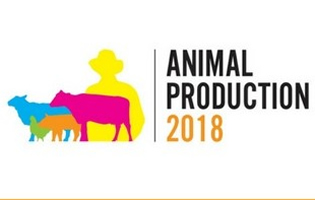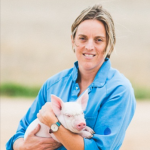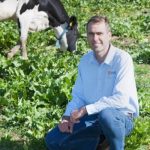
Keynote speakers announced:
Animal Production 2018 is excited to announce four keynote speakers invited to speak on innovation, big data, heat stress and consumer demands.
The conference is on 2-4 July in Wagga Wagga NSE>
The program is taking shape! Keynote speakers join the four leading scientists we’ve already announced to present the Memorial Lectures.
 |
Edwina BeveridgeFarmer and Innovator, NSWOPENING SESSION |
Topic: Edwina will highlight the need for innovation in Australia’s livestock industries, drawing on the innovation examples in her own farm system to meet consumer needs.
Edwina and her husband own and operate Blantyre Farms, a 2,200 sow pig farm and a mixed farm of sheep, cattle and crops. In the last ten years, the pig farming operation has doubled in size, plans are underway to continue expansion. In operation for five years, a methane digestion system captures methane gas from pig manure and converts it into electricity. Blantyre also utilises other people’s food waste products for pig feed and saves thousands of tonnes of landfill.
Edwina has a commerce degree from the University of Sydney and is a former chartered accountant turned pig farmer. Edwina is on the board of Australian Pork Limited, the Deputy Chair of the NSW Farmers Pork Committee and is a member of the NSW Primary Industries Ministerial Advisory Committee. She has 3 children, is involved in her local community and is proud to be a farmer.
 |
Dr Cameron ClarkUniversity of SydneyBIG DATA – WHAT’S THE |
Topic: Dairy farming within boundaries: Taking away complexity whilst adding efficiency through technology
Dr Cameron Clark is enabling a step-change in livestock productivity and welfare both in Australia and internationally through novel, collaborative and interdisciplinary research. This research is changing the global focus of farming towards the individual production animal to improve efficiency and welfare by revealing the value of technology, data and associated advanced precision livestock systems. He plans to expand on this highly innovative research to link the individual production animal and farm practice with the needs of the market and in so doing, add significant value to the food produced in systems that exceed the welfare demands of society. Cameron is a senior research fellow at the University of Sydney.
 |
Dr Jay JohnsonUnited States Department
|
Topic: Evaluating and mitigating the impact of heat stress on livestock well-being and productivity
Dr Jay Johnson is a Research Animal Scientist with the USDA Agricultural Research Service in West Lafayette, Indiana specializing in Environmental Stress and Nutritional Physiology. He received his Bachelor and Masters degrees from the University of Missouri, his PhD from Iowa State University, and completed his postdoctoral training at Purdue University. The overall goal of Dr Johnson’s research program is to evaluate the impact of environmental and production stressors on livestock physiology, welfare, and metabolic health to develop management and nutritionally-based mitigation strategies that will improve animal well-being and productivity.
Specific areas of research include the effects of weaning and transport stress on the well-being of swine provided L-glutamine as an antibiotic alternative, the impact of in-utero heat stress on postnatal productivity and bioenergetics in swine, and the use of rapid versus gradual cooling after extreme heat events.
 |
Prof Wendy UmbergerUniversity of Adelaide, AusCONSUMER DEMANDS |
Topic: Demand for Animal Welfare and Ethical Attributes in Meat: What do consumers really value?
Professor Wendy Umberger is the Foundation Executive Director of the Centre for Global Food and Resources (GFAR) at the University of Adelaide. She was the 2016-2017 President of the Australasian Agricultural and Resource Economics Society (AARES). She is a Fellow of Food Standards Australia New Zealand (FSANZ), serves on the Governance Board of the International Crops Research Institute for Semi-Arid Tropics (ICRISAT) and the editorial board of Applied Economic Perspectives and Policy.
She has spoken globally on topics related to her behavioural economics research, which uses innovative methods to understand drivers and implications of changing consumer and producer behaviour on food systems. She is also studying the impact of urbanisation, modern retail transformation and development programs on food consumption patterns, diet quality and longer-run health and livelihood implications across the region, including Australia, Indonesia, Vietnam and Fiji. She holds a Bachelor of Animal Science (1996) and Masters in Economics (1998) from South Dakota State University and a PhD in Agricultural Economics (2001) from the University of Nebraska-Lincoln. Wendy was raised on a beef cattle and grain farm, which is still owned and operated by her parents in South Dakota USA.